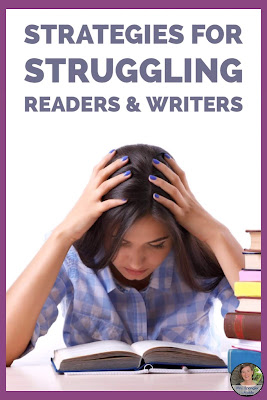We all have students that struggle for a variety of reasons. But what are some of the best, classroom-tested strategies that can be used to help our students? This is exactly what we discussed on the #2ndaryELA Twitter chat!
As you scroll through, I hope you'll find some new ideas to try in your own classroom!
Q1: What programs or other help does your school have for struggling readers or writers? #2ndaryELA
A1: Primarily Read 180 & other computer programs. I'm not sold on computer programs being the sole support for struggling readers, though! Would love to hear what others do & use #2ndaryELA
A1: Mix of programs and supports. Sometimes a challenge finding appropriately leveled texts in our content areas. #2ndaryela
Q2: What is your biggest challenge with helping your struggling readers or writers? #2ndaryELA
A2: I have found that one of the biggest struggles is that some kids with a lower reading ability don't think there is a problem. They shout, "I know how to read!" and refuse to work on the skill or cooperate with you if you try an intervention. #2ndaryela
A2: Finding real world & meaningful opportunities to practice skills outside of the isolation of the classroom. Also being able to provide intensive support with large class sizes #2ndaryELA
#2ndaryELA A2- my current struggle is attention span! I want to find better ways to help learners recognize their own attention and prolong the time they can focus on reading or writing tasks
A2: I think for most teachers the hardest part is differentiating when you have 130 or so students. #2ndaryELA
Q3: What has worked for you in helping your struggling readers or writers become more proficient? #2ndaryELA
A3: Words Their Way has been an affordable and engaging phonics, spelling, and vocabulary program that I'm able to incorporate into a HS learning support classroom easily #2ndaryELA
A3: Struggling Writers: Sentence stems, fill in the blank essays, using acronyms for the organization of essays, & #pixanotes https://www.teacherspayteachers.com/Store/Mrs-Spangler-In-The-Middle/Category/-10048-Pixanotes-230125 … #2ndaryELA
A3: Here's an example of one of the ways I used scaffolding to teach writing: https://mrsspanglerinthemiddle.blogspot.com/2018/03/essay-writing-hack-for-struggling.html … #2ndaryELA
A3: Having Ss be a part of the goal setting process. Show them evidence of their progress and growth and they will (hopefully) buy in. Data collection doesn’t always have to be the T’s secret. #2ndaryELA
A3: Go against my better judgment and allow them to read a text in funny voices when they have to read out loud. It works like a charm if the voice can be understood, and it relieves tension and causes people to laugh. More people volunteer to read. #2ndaryela
Q4: What do you do to help to motivate these students? #2ndaryELA
A4: On writing, specifically, I think it starts with getting Ss excited about their claims and ideas. Giving them choice in prompts helps motivate them — but if they hate their thesis/claim they will hate the whole process #2ndaryELA
A4: For motivating struggling writers, you might try a variation of the "Essay Champs" activity I used in my classroom and blogged about here: https://mrsspanglerinthemiddle.blogspot.com/2018/03/essay-champs-and-mud-pies.html … #2ndaryELA
A4: Celebrate growth! And build on any strengths and incorporate them into the classroom #2ndaryELA
I like to "hack" silent reading time.
Here are a few ways as to HOW to motivate those readers who aren't yet reading as much as we'd like: http://geniushour.blogspot.com/2016/01/hacking-silent-reading-time.html …
#2ndaryela #elachat #engchat #nerdybookclub
Q5: Share any resources that have made a difference for your struggling readers and writers. #2ndaryELA
A5: In literature class, we use the Pearson Common Core online textbook (we have a 1:1 iPad initiative with the middle schoolers.) There is an audio button on each page, so students can play that at home while they are reading and follow along. #2ndaryela
A5: The "Essay Champs" made a big difference for my struggling writers to finally "get it" and my Essay Videos allowed Ss to re-watch lessons. https://www.teacherspayteachers.com/Product/Text-Based-Informative-Essay-UNIT-Step-by-Step-VIDEO-Lessons-with-Pixanotes-3317041 … #2ndaryELA
A5: I also have been working on building in differentiation into my unit plans with the pattern of teach-reteach-enrich. I call it TRESmart: Free theme unit ~ https://www.teacherspayteachers.com/Product/Theme-TRESmart-Mini-Unit-with-PowerPoint-Pixanotes-Word-Wall-More-3944723 … #2ndaryELA
A5: @KyleneBeers text "When Kids Can't Read What Teachers Can Do" is packed with good instructional strategies to help make the act of reading visible for struggling readers #2ndaryELA
Agreed. And finding appropriately leveled texts that are also age-appropriate. Many of my students can talk and discuss at a higher level than they can read and comprehend. #2ndaryELA
Saddleback Publishing has a great selection of books that have middle and high school topics written at a lower reading level. I love them for SPED and ELL. #2ndaryELA
Remeber, we keep the conversation going 24/7 at our Facebook Group and we'd love for you to join!
You can also get reminded of our weekly chats!
Thanks for stopping by!







